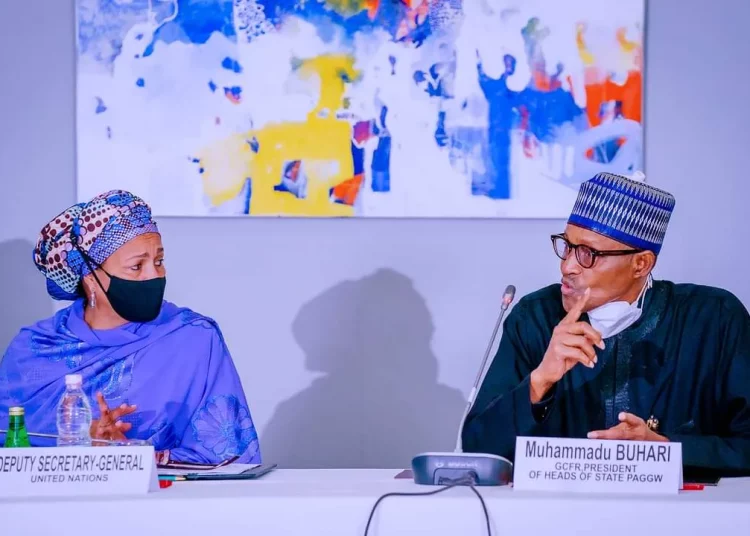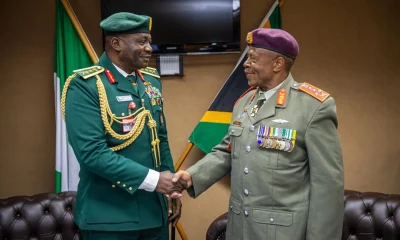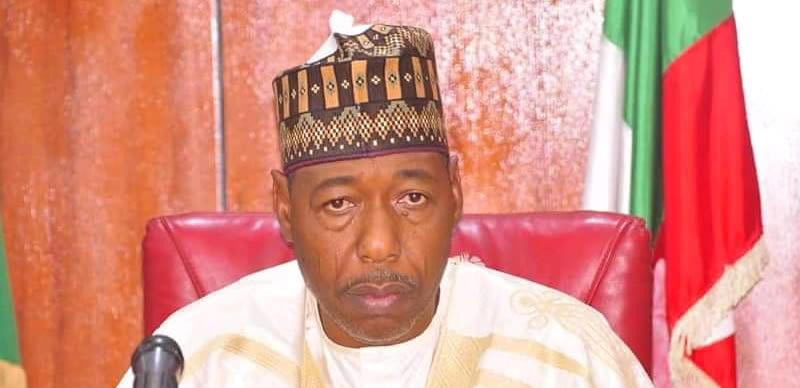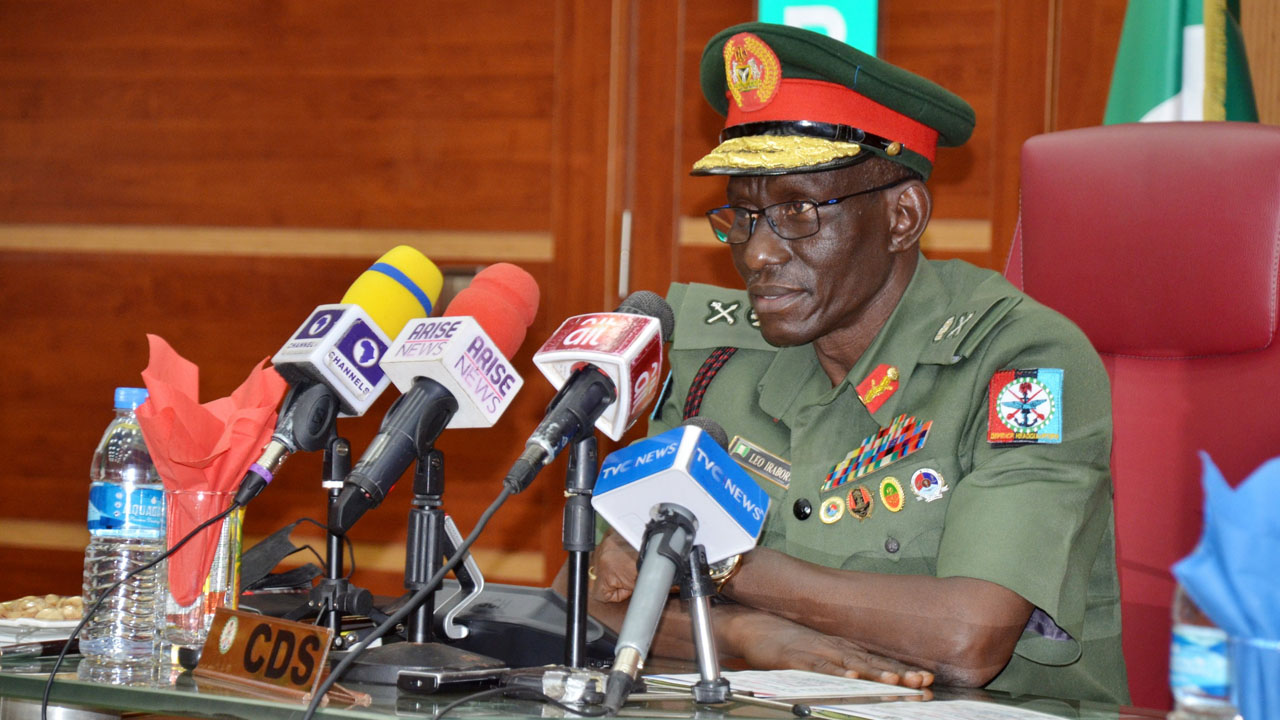Africa
Buhari Backs Establishment of African Standby Force on Terrorism

By Derrick Bangura
President Muhammadu Buhari has backed the recommendation of the African Union Commission for the setting up of a Standby Force on Terrorism in the continent.
This is just as he charged African leaders to muster the political will that will fuel synergy, enhance intelligence gathering and bring more urgency in tackling violent crimes.
Also, President Buhari charged African political leaders to respect the right of citizens to make their choices in elections, saying the right to vote and determine who leads them should not be treated lightly.
Speaking Saturday in Malabo, Equatorial Guinea during the 16th African Union Extra-ordinary Session of the Assembly of African Union on Terrorism and Violent Extremism in Africa, the president said resources meant for development of countries had been channelled into fighting violent crimes, leaving many governments with less options on investing in people to meet the targets of Sustainable Development Goals.
With the presentation of a report on Terrorism and Violent Extremism in Africa at the meeting, President Buhari highlighted four items on the recommendation for immediate action.
He said: “In the West African region, we are working very hard through the instrumentality of ECOWAS to combat terrorism. The Multi National Joint Task Force in the Lake Chad region and the G5 in the Sahel have continued to degrade the insurgents by substantially reducing their capacity to inflict harm on our citizens.
“Mr. Chairman, these efforts however, need to be strengthened and complemented by the African Union, through the African Union Peace and Security Architecture.
“It is for this reason, Mr. Chairperson, that we endorse the key recommendations contained in your report. Some of the recommendations which we believe should be implemented immediately include;
“Increasing troop levels in situations of combating terrorism, and enhancing intelligence capabilities of deployed troops, including improving the operational cooperation of contingents in the operation areas;
“Ensuring the readiness of the African Standby Force for immediate response when a member state is under terrorist threat;
“Strengthening the fight against cybercrime, money laundering, drugs and arms trafficking, smuggling of persons and counterfeit goods, which facilitate terrorist financing; and
“Ensuring that specialised institutions like the African Centre for the Study and Research on Terrorism and AFRIPOL, are adequately resourced in order for them to effectively discharge their mandate”.
While validating the report on terrorism, the president underscored the need for political will to forge a “Coordinated Continental Approach to tackling insecurity.’’
“It is for this reason, that we commend the Chairperson of the Commission for his comprehensive report on Terrorism and Violent Extremism in Africa. The report is very enriching, resonating and it behoves on us as the Assembly of the African Union to show the political will and forge a Coordinated Continental Approach to tackling insecurity, as we must entrench peace and stability on our continent,’’ he added.
According to him, the recommendations, if implemented, will go a long way in increasing the capacity of affected states to respond to the threats posed by terrorists and violent extremists in their respective countries.
He said: “Your Excellencies, this summit affords us yet another opportunity as leaders of the continent to rub minds and take far reaching decisions to address the challenges of terrorism and violent extremism on our continent.
“The activities of these sinister groups have not only led to the loss of valuable lives and property.
“They have equally taken a drastic toll on our national economies. The capacity of Governments to address infrastructural needs and other developmental challenges, in line with our Sustainable Development Goals is grossly diminished.
“The resources meant for developmental programmes are being channeled to fight terrorists and violent extremists, who are currently rampaging our continent”.
Earlier, the Chairperson of the African Union Commission, H.E. Moussa Faki Mahamat, had presented the Commission’s Reports on the Prevention and Combating of Terrorism and Violent Extremism and on Unconstitutional Changes of Government in Africa.
The report looked at persistent threats, evaluated current response mechanisms, and decided on the specific actions and measures necessary to strengthen the collective security of Member States facing terrorism and violent extremism.
The report also recommended actionable measures needed to stem the upsurge on the continent.
Buhari Urges African Presidents to Respect Citizens’ Right to Choose Their Leaders
In related development, speaking at a bilateral meeting with the President of Malawi, Lazarus Chakwera, President Buhari charged African political leaders to respect the right of citizens to make their choices in elections, saying the right to vote and determine who leads them should not be treated lightly.
He said in a move to strengthen the continent’s democratic fabric and ensure smooth conduct of elections, “we must convince the people that we respect them, and this is by allowing them to choose whoever they want.”
The president acknowledged that the path to democracy in African countries had not been a smooth one, recalling that he had been to the Supreme Court three times before he became President.
“I had to openly disabuse the minds of our colleagues. We are a developing country, that we should not be demoralised.
“We have to go through these processes. We must trust these institutions to do what is right. Present the evidence. Don’t give up. Keep on pushing,” Buhari explained.
He explained that the merit of one’s case, not religion, or ethnicity or section would determine success in political endeavors. He stated that his meritorious cases in court were thrown out by judges who more or less shared the same sentimental backgrounds with him.
“So, I say go for merit. Don’t stand on ethnicity or such other divisive factors,” the president said.
Commenting on the relationship between Nigeria and Malawi, and that of the Southern African Sub-region in general, President Buhari said his predecessors in office, especially the late General Murtala Muhammed laid out the continental rule of engagement placing Southern African countries on Nigeria’s priority list.
He said: “We are acutely aware of the problems of Southern African countries, more than most others.
“Murtala virtually left the country to General Olusegun Obasanjo, then, and faced up to Europe and America on the problems of apartheid. He was very energetic and patriotic. We will continue on that path,” Buhari added.
President Buhari said he greatly valued his meeting with President Chakwera, giving assurances that he would pay attention to the issues brought to the meeting.
The Foreign Affairs Ministers of the two countries were directed to take the matters forward.
In his remarks, President Chekwara described President Buhari as a statesman and role model. He added that his country was willing to learn from Nigeria’s experience in agriculture, infrastructure development and in managing security and violent extremism, which, he said, were creeping into the South African sub-region.
According to him, while both countries were together in the framework of the African Continental Free Trade Agreement, his country’s wish was for a speedy trade relationship with Nigeria.
President Chekwara asked for the convening of a meeting of technical experts to discuss trading pacts, Memoranda of Understanding (MoU) and agreements.
He said: “There is no way we won’t relate to the biggest economy in Africa. Our older brother should hold our hands and we walk together”.
President of São Tomé, Carlos Vila Novo and his spouse also met President Buhari and the First Lady, Mrs. Aisha Buhari.
The Sao Tomean President got assurances that Nigeria will continue to play a brotherly role in the affairs of sister African countries.
President Buhari also received in audience the President of Equatorial Guinea, Teodoro Obiang Nguema Mbasogo who came to thank him for honouring the invitation for the Extraordinary African Union Summit in his country.
Africa
When the Gatekeeper Fumbles: JAMB’s Error and the Future of Our Youth

When the Gatekeeper Fumbles: JAMB’s Error and the Future of Our Youth
By Matthew Eloyi
It is not every day that a public official publicly sheds tears. And so, when the Registrar of the Joint Admissions and Matriculation Board (JAMB), Professor Ishaq Oloyede, broke down while admitting to errors in the conduct of the 2025 Unified Tertiary Matriculation Examination (UTME), it was a deeply emotional moment. But make no mistake: while the tears may have reflected remorse, they cannot wash away the consequences of what is, quite frankly, a systemic failure.
Let us be clear — JAMB is not merely an examination body. It is a gatekeeper to higher education in Nigeria. It is the bridge between dreams and their realisation for millions of young Nigerians. To fumble that responsibility is not a technical error; it is a breach of trust with life-altering consequences.
With nearly 380,000 candidates now required to retake the exam due to technical glitches and irregularities, one cannot help but ask: How did we get here? And more importantly, why does this keep happening?
For years, JAMB has marketed its transition to computer-based testing as a step toward modernisation. Yet each year seems to expose new cracks in its implementation — from faulty computer systems and power outages to incomplete biometric verification and poorly configured questions. These are not unforeseeable anomalies. They are predictable outcomes of poor planning, lack of oversight, and inadequate investment in infrastructure.
Imagine the psychological toll on the students, many of whom studied day and night, only to be met with malfunctioning systems and flawed questions. Some walked out of examination halls in tears, their confidence shattered, their futures placed in limbo. For those in remote or under-resourced areas, the technical errors are compounded by infrastructural and economic disadvantages. What we are witnessing is not just an exam failure; it is an institutional failure that amplifies inequality.
JAMB’s decision to allow affected candidates a resit is necessary, but it is insufficient. What about those who may never realize they were victims of the glitch? What about those whose faith in the process has been irreparably broken?
Professor Oloyede’s tears may have been sincere, but what Nigerian students need now is not emotion — it is accountability. Heads must roll, systems must be overhauled, and the entire structure must be audited. We cannot allow a body that plays such a pivotal role in shaping the nation’s intellectual future to operate with such recklessness.
The UTME is a rite of passage for Nigerian students; it should not become a roulette of misfortune. Until JAMB can guarantee a glitch-free, fair, and standardised assessment, its credibility will remain on shaky ground.
In the end, our children deserve better. They deserve an education system that works; not one that breaks down and apologises after the damage is done.
Africa
ECOWAS Confirms Burkina Faso, Mali, Niger’s Exit, Keeps Doors Open for Return

The Economic Community of West African States (ECOWAS) has confirmed that the withdrawal of Burkina Faso, Mali, and Niger from the regional bloc takes effect from January 29, 2025.
ECOWAS spokesperson Joel Ahofodji, in a statement on Wednesday, said the decision aligns with the ECOWAS authority’s resolution and reflects the spirit of regional solidarity and the interests of the people.
Despite their exit, Ahofodji emphasized that the bloc remains open to the return of the three Sahel nations whenever they choose.
“All relevant authorities within and outside ECOWAS Member States should take note of this development,” he said.
To minimize disruptions, ECOWAS urged the continued recognition of national passports and identity cards bearing the ECOWAS logo held by citizens of Burkina Faso, Mali, and Niger until further notice.
Additionally, the commission called for the continued application of the ECOWAS Trade Liberalisation Scheme (ETLS) and investment policies for goods and services from the departing nations. It also stressed that their citizens should retain the right to visa-free movement, residence, and establishment under existing ECOWAS protocols.
Furthermore, ECOWAS requested full support and cooperation for its officials from the three countries as they continue their assignments.
“These arrangements will be in place until the full determination of the modalities of our future engagement with the three countries by the ECOWAS Authority of Heads of State and Government,” Ahofodji stated.
He revealed that ECOWAS has set up a structure to facilitate discussions on these modalities, ensuring a smooth transition.
“This message is necessary to avoid confusion and disruption in the lives and businesses of our people during this transition period,” he added.
The News Agency of Nigeria (NAN) reports that Burkina Faso, Mali, and Niger initially announced their intention to leave ECOWAS on January 29, 2024, in accordance with the bloc’s protocol, which allows for a 12-month notice period. In December 2024, ECOWAS officially acknowledged their right to exit but reiterated its willingness to welcome them back in the future.
Africa
Customs hands over illicit drugs worth N117.59m to NDLEA

The Nigeria Customs Service (NCS), Ogun Area 1 Command, has handed over illicit drugs worth N117.59 million to the National Drug Law Enforcement Agency (NDLEA).
The Comptroller of the command, Mr James Ojo, disclosed this during the handing over of the drugs to Mr Olusegun Adeyeye, the Commander of NDLEA, Idiroko Special Area Command, in Abeokuta, Ogun, on Friday.
Ojo said the customs handed over the seized cannabis and tramadol tablets to the Idiroko Special Command for further investigation in line with the standard operating procedures and inter-agency collaboration.
He said the illicit drugs were seized in various strategic locations between January and November 21, 2024, in Ogun State.
He added that the illicit drugs were abandoned at various locations, including the Abeokuta axis, the Agbawo/Igankoto area of Yewa North Local Government Area, and Imeko Afton axis.
Ojo said that the seizure of the cannabis sativa and tramaling tablets, another brand of tramadol, was made possible through credible intelligence and strategic operations of the customs personnel.
“The successful interception of these dangerous substances would not have been possible without the robust collaboration and support from our intelligence units, local informants and sister agencies.
“These landmark operations are testament to the unwavering dedication of the NCS to safeguard the health and well-being of our citizens and uphold the rule of law,” he said.
He said the seizures comprised 403 sacks and 6,504 parcels, weighing 7,217.7 kg and 362 packs of tramaling tablets of 225mg each, with a total Duty Paid Value of N117,587,405,00.
He described the height of illicit drugs smuggling in the recent time as worrisome.
This, he said, underscores the severity of drug trafficking within the borders.
“Between Oct. 13 and Nov. 12 alone, operatives intercepted a total of 1,373 parcels of cannabis sativa, weighing 1,337kg and 362 packs of tramaling tablets of 225mg each,” he said.
Ojo said the seizures had disrupted the supply chain of illicit drugs, thereby mitigating the risks those substances posed to the youth, families and communities.
He lauded the synergy between its command, security agencies and other stakeholders that led to the remarkable achievements.
Ojo also commended the Comptroller General of NCS for creating an enabling environment for the command to achieve the success.
Responding, Adeyeye, applauded the customs for achieving the feat.
Adeyeye pledged to continue to collaborate with the customs to fight against illicit trade and drug trafficking in the state.
-

 Headlines4 years ago
Headlines4 years agoFacebook, Instagram Temporarily Allow Posts on Ukraine War Calling for Violence Against Invading Russians or Putin’s Death
-

 Headlines4 years ago
Headlines4 years agoNigeria, Other West African Countries Facing Worst Food Crisis in 10 Years, Aid Groups Say
-

 Foreign3 years ago
Foreign3 years agoNew York Consulate installs machines for 10-year passport
-

 News1 year ago
News1 year agoZero Trust Architecture in a Remote World: Securing the New Normal
-

 Entertainment3 years ago
Entertainment3 years agoPhyna emerges winner of Big Brother Naija Season 7
-

 Headlines1 year ago
Headlines1 year agoNigeria Customs modernisation project to check extortion of traders
-

 Entertainment2 years ago
Entertainment2 years agoMovie download platform, Netnaija, announces closure
-

 Economy2 years ago
Economy2 years agoWe generated N30.2 bn revenue in three months – Kano NCS Comptroller















